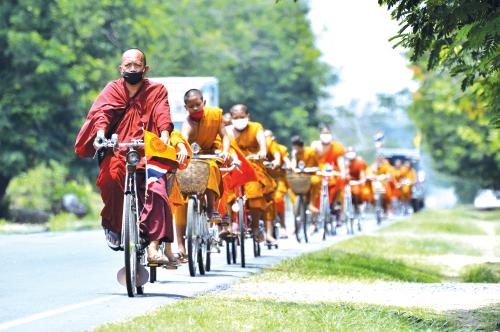Blazing Saddles: Cycling to happiness

PHUKET: In 2006 the United Nations announced that more than half the world’s population was now living in urban areas and that by 2030 almost five billion of us will be urbanized.
Like most areas of rapid urbanization, Phuket has being deeply wounded by the rush to develop. Firstly, the island has become progressively reoriented around motorized traffic and secondly many public spaces and resources have been privatized.
This reorganization of our island is unfair and cruel as the urbanized residents of Phuket are increasingly denied the opportunity to enjoy simple daily pleasures such as walking on convivial streets, sitting around in public areas, or just playing together.
Children have largely disappeared from Phuket’s streets which have have been rendered dangerous and polluted by traffic volume. Phuket’s rapid urbanization is driven by people seeking a better life for themselves through increased prosperity.
Tourism workers, developers, hoteliers, restaurateurs, noodle vendors, yacht brokers and media types all share this common desire, and yet Phuket seems to be making people more miserable and stressed through this pursuit of prosperity.
The sad thing is that the more people flock to Phuket for the good life – money, opportunity, novelty – the more crowded, expensive, polluted and congested the island becomes. The result? Surveys show that Phuketians rate themselves as among the least happy people in Thailand, despite living in one of the richest regions in the country.
Is Phuket’s urban design really powerful enough to make or break our happiness? The question deserves consideration, because the most dynamic economies of the 20th century have produced the most miserable cities according to the World Health Organization. Surely not what we are trying to do here?
If one was to judge by sheer wealth, the last half-century should have been an ecstatically happy time for people in the US and other rich nations such as Canada, Japan and Great Britain. And yet the boom decades of the late 20th century were not accompanied by a boom in well being. Indeed the British got richer by more than 40 per cent between 1993 and 2012, but the rate of psychiatric disorders and neuroses grew exponentially.
Sadly an unintended consequence of Phuket’s urbanization and traffic density is that our human networks and the interactions are becoming degraded. People just don’t want to engage with the traffic to go out and see friends and relatives like they used to. Upon returning from the daily commute to work, many Phuketians collapse in a deranged heap in front of the TV and hibernate.
Much as we complain about other people, there is nothing worse for mental health than a social desert. The more connected we are to family and community the less likely we are to experience heart attacks, strokes, cancer and depression. Connected people sleep better at night. They live longer. They consistently report being happier.
There is a clear connection between social deficit and the shape of urbanization. A Swedish study found that people who endure more than a 45-minute commute were 40 per cent more likely to divorce. People who live in mono-functional, car dependent neighborhoods are much less trusting of other people than people who live in walkable neighborhoods where housing is mixed with shops, services and work places.
However, one particular group of commuters report enjoying themselves. These are people who travel to work under their own steam… they walk, run, or ride bicycles.
Why would travelling more slowly and using more effort offer more satisfaction than driving? Part of the answer exists in our basic human physiology.
We were born to move. Immobility is to the human body what rust is to a car. Stop moving long enough and your muscles will atrophy. Bones will weaken. Blood will clot. You will find it harder to concentrate and solve problems. Immobility is not merely a state that is closer to death… it actually hastens it.
Cycling gives even a lazy rider the ability to travel three or four times faster than someone walking, while using less than a quarter the energy. Cyclists report feeling connected to the world around them in a way that is simply not possible in the sealed environment of a car, bus or train. Their journeys are both sensual and kinesthetic.
So if we really care about freedom for everyone, we need to plan Phuket’s urbanization for everyone, not just the brave or foolhardy who are currently willing to risk their lives in order to cycle.
The TAT recently saw fit to try and capitalize on the global passion for cycling by declaring the country a cyclist’s paradise. This is of course pure hype, with no tangible initiatives to support the rhetoric.
But Phuket could quite easily be made more of a cyclists’ paradise by constructing cycling and walking pathways around perimeter areas such as Cape Panwa, the Nai Harn headland, Chalong Bay or through the central mountain peaks.
The investment costs would be minimal and could be readily amortized by charging a small fee to cycle or walk the pathways. Bike hire and cycle-friendly cafes along the way would offer locals employment and business opportunities.
Will any of this happen? While holding your breath is probably wise while cycling along Phuket’s main arteries, doing so in anticipation of such positive cycling initiatives appearing here is probably a fast track to asphyxiation!
While the search for happiness continues, chances are you’ll get there on a bike.
— Baz Daniels
Latest Thailand News
Follow The Thaiger on Google News:
























